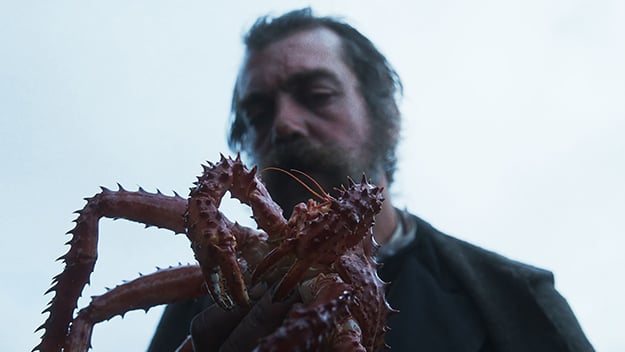Film Comment Recommends: The Tale of King Crab
This article appeared in the April 7, 2022 edition of The Film Comment Letter, our free weekly newsletter featuring original film criticism and writing. Sign up for the Letter here.

The Tale of King Crab (Alessio Rigo de Righi and Matteo Zoppis, 2022)
Alessio Rigo de Righi and Matteo Zoppis’s fiction feature debut is a Matryoshka doll of tales within tales. The film unfurls as a legend passed down through generations, paying tribute to a culture where communities are held together by the fables they share and reshape with each new telling. The Tale of King Crab opens at a lodge in present-day Tuscia, in central Italy—where a gaggle of elderly hunters share pasta and local lore—before teleporting us to a nearby hamlet at the turn of the 20th century. It’s here that we first meet Luciano (Gabriele Silli), a gangly drifter with a thick beard and cobalt eyes that seem to hide a lifetime of secrets. Luciano spends the first of the film’s two chapters rebelling against the local prince, with whom he is competing for the affections of a young villager, Emma (Maria Alexandra Lungu). After the combustible love triangle culminates in fiery tragedy, he’s forced to flee town.
When we see him next, Luciano is clad in the soutane of a Salesian priest and in possession of a magic crab that will supposedly lead its owner to a treasure buried high in the mountains of a remote, desolate Patagonian island. Taken captive by a band of ratty pirates who force him at gunpoint to interpret the crab’s mysterious signals, Luciano’s situation is dire, though his dead-eyed stare doesn’t betray much. The sudden changes in locale and character mirror a shift in the film’s tones and genres, as The Tale of King Crab abandons the bucolic, folkloric reveries of its first half—reminiscent of the work of Alice Rohrwacher—to swell into a stranger-in-a-strange-land parable that harkens to Lisandro Alonso’s Western-adjacent Jauja and Werner Herzog’s South American fever dreams. It’s a jarring shift that nevertheless feels of a piece with the film’s meandering dream logic, made vivid by cinematographer Simone D’Arcangelo’s pictorial tableaux and punctuated by folk songs that comment on the proceedings like Greek choruses. Roaming an alien landscape in search of mysterious riches, King Crab aligns its protagonist’s tragedy to the stories of the countless Italians who left their country to seek fortunes abroad and who, throughout their travels, nursed an incurable longing for their native soil. After all, as he tells a pirate in the film’s most revealing exchange, it is not gold Luciano is pursuing, but a ticket home.







